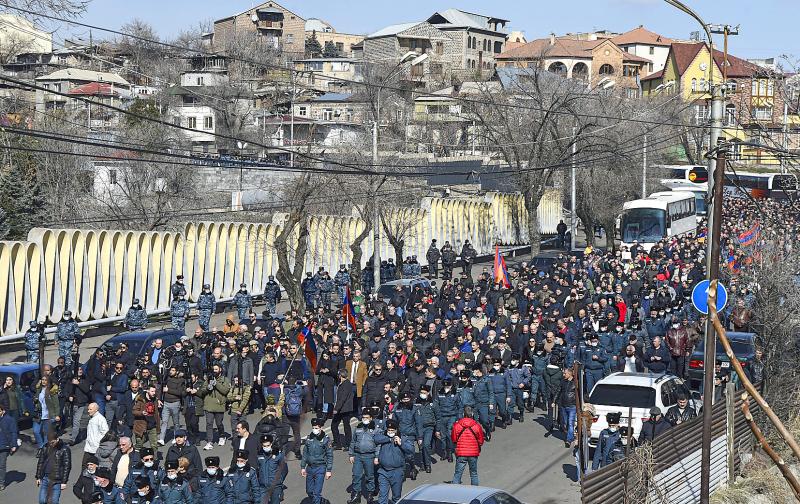Political tensions in Armenia remained high on Friday, a day after the prime minister accused top military officers who demanded his resignation of an attempted coup.
Armenian Prime Minister Nikol Pashinyan has faced opposition calls to step down over a peace deal on Nov. 10 last year that ended six weeks of fierce fighting with Azerbaijan over the Nagorno-Karabakh region.
The peace agreement saw Azerbaijan reclaim control over large parts of Nagorno-Karabakh and surrounding areas that had been held by Armenian forces for more than a quarter-century.

Photo: EPA-EFE / Lusi Sargsyan / Photolure
Earlier this week, Pashinyan dismissed the first deputy chief of the military’s general staff that includes the armed forces’ top officers. In response, the general staff on Thursday called for Pashinyan’s resignation, but he doubled down and ordered that the chief of the general staff be dismissed.
Pashinyan’s spat with the top military officers encouraged opposition supporters. More than 20,000 rallied in the Armenian capital, Yerevan, demanding the prime minister’s resignation, while Pashinyan led his own supporters at a rival rally.
Some opposition demonstrators put up tents outside the government headquarters and barricaded the main avenue to press their demand for Pashinyan’s resignation.
The top military officers did not make any further moves on Friday in the wake of their demand for Pashinyan to step down.
Pashinyan’s order on Thursday to dismiss Colonel General Onik Gasparyan is subject to approval by the nation’s largely ceremonial president, Armen Sarkissian, who has three days to decide.
Sarkissian, who has had previous frictions with Pashinyan and earlier called on him to step down, on Friday met with Gasparyan and opposition leaders, but did not make any public statements.
Speaking at Friday’s rally, opposition leader Vazgen Manukyan said that “the next few days will be decisive for our struggle.”
If Pashinyan succeeds in forcing the general staff chief out, “the army will rise,” he added.
The crisis has its roots in Armenia’s humiliating defeat in heavy fighting with Azerbaijan over Nagorno-Karabakh that erupted in late September last year and lasted 44 days. A Russia-brokered agreement ended the conflict, in which the Azerbaijani army routed Armenian forces — after more than 6,000 people died on both sides.
Pashinyan has defended the peace deal as a painful, but necessary, move to prevent Azerbaijan from overrunning the entire Nagorno-Karabakh region, which lies within Azerbaijan, but was under the control of ethnic Armenian forces backed by Armenia since a separatist war there ended in 1994.

Republican US lawmakers on Friday criticized US President Joe Biden’s administration after sanctioned Chinese telecoms equipment giant Huawei unveiled a laptop this week powered by an Intel artificial intelligence (AI) chip. The US placed Huawei on a trade restriction list in 2019 for contravening Iran sanctions, part of a broader effort to hobble Beijing’s technological advances. Placement on the list means the company’s suppliers have to seek a special, difficult-to-obtain license before shipping to it. One such license, issued by then-US president Donald Trump’s administration, has allowed Intel to ship central processors to Huawei for use in laptops since 2020. China hardliners

Conjoined twins Lori and George Schappell, who pursued separate careers, interests and relationships during lives that defied medical expectations, died this month in Pennsylvania, funeral home officials said. They were 62. The twins, listed by Guinness World Records as the oldest living conjoined twins, died on April 7 at the Hospital of the University of Pennsylvania, obituaries posted by Leibensperger Funeral Homes of Hamburg said. The cause of death was not detailed. “When we were born, the doctors didn’t think we’d make 30, but we proved them wrong,” Lori said in an interview when they turned 50, the Philadelphia Inquirer reported. The

RAMPAGE: A Palestinian man was left dead after dozens of Israeli settlers searching for a missing 14-year-old boy stormed a village in the Israeli-occupied West Bank US President Joe Biden on Friday said he expected Iran to attack Israel “sooner, rather than later” and warned Tehran not to proceed. Asked by reporters about his message to Iran, Biden simply said: “Don’t,” underscoring Washington’s commitment to defend Israel. “We are devoted to the defense of Israel. We will support Israel. We will help defend Israel and Iran will not succeed,” he said. Biden said he would not divulge secure information, but said his expectation was that an attack could come “sooner, rather than later.” Israel braced on Friday for an attack by Iran or its proxies as warnings grew of

A prominent Christian leader has allegedly been stabbed at the altar during a Mass yesterday in southwest Sydney. Bishop Mar Mari Emmanuel was saying Mass at Christ The Good Shepherd Church in Wakeley just after 7pm when a man approached him at the altar and allegedly stabbed toward his head multiple times. A live stream of the Mass shows the congregation swarm forward toward Emmanuel before it was cut off. The church leader gained prominence during the COVID-19 pandemic, amassing a large online following, Officers attached to Fairfield City police area command attended a location on Welcome Street, Wakeley following reports a number